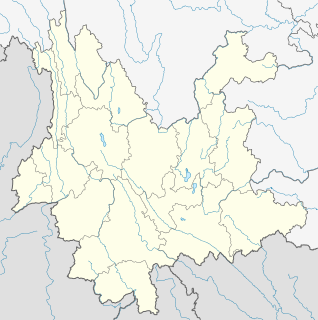
Dianchi Lake, also known as Lake Dian and Kunming Lake, is a large lake located on the Yunnan-Guizhou Plateau close to Kunming, Yunnan, China. Its nickname is the "Sparkling Pearl Embedded in a Highland" and it was the model for the Kunming Lake in the Summer Palace in Beijing. Its name is the source of Yunnan's Chinese abbreviation 滇.
Sinocyclocheilus is a genus of freshwater fish in the family Cyprinidae endemic to China, where only found in Guangxi, Guizhou and Yunnan. Almost all of its species live in or around caves and most of these have adaptions typical of cavefish such as a lack of scales, lack of pigmentation and reduced eyes. Several species have an unusual hunchbacked appearance and some of the cave-dwellers have a "horn" on the back, the function of which is unclear. In contrast, the Sinocyclocheilus species that live aboveground, as well as a few found underground, show no clear cavefish adaptions. They are relatively small fish reaching up to 23 cm (9.1 in) in length. The individual species have small ranges and populations, leading to the status of most of the evaluated species as threatened. Many species populations in the genus have yet to be evaluated by the IUCN.
The gold-colored angle fish is a species of cyprinid fish.
The eyeless golden-line fish or blind golden-line barbel is a species of ray-finned fish in the family Cyprinidae. It is a cave-dwelling, blind species only known from the Yiliang County, Yunnan, China. Its maximum length is 113 mm (4.4 in) SL.
The hyaline fish is a species of ray-finned fish in the family Cyprinidae. This threatened species is found only in Yunnan in China. Like many other cavefish, it lacks scales, pigmentation and external eyes. The first recorded description of an obligate cavefish involved this species, when mentioned in 1540 in the travel notes of Yingjing Xie, a local governor of Guangxi.

Luliang County is a county under the administration of the prefecture-level city of Qujing, in the east of Yunnan province of southwestern China.

Fuxian Lake stretches out through Chengjiang, Jiangchuan and Huaning Counties in Yunnan Province, spanning an area of 212 square kilometers. The lake is ranked third-largest in Yunnan, after Dian Lake and Erhai Lake. Also the deepest lake in Yunnan, it is 155 meters deep at its greatest depth. It is also the third-deepest fresh water lake in China, after Tianchi and Kanas Lake.

Tian'e is a county of northwestern Guangxi, China, located on the upper reaches of the Hongshui River and bordering Guizhou province to the northwest. It is under the administration of the prefecture-level city of Hechi.

Donglan County is a county of northwest Guangxi, China. It is under the administration of Hechi City.
Sinocyclocheilus altishoulderus is a species of cave fish in the family Cyprinidae. It is endemic to Guangxi province in southern China, and only known from a cave in Donglan County, from a subterranean tributary of the Hongshui River, a tributary of the Pearl River.
Sinocyclocheilus donglanensis is a species of cave fish in the family Cyprinidae. It is endemic to Guangxi province in southern China, and only known from a subterranean tributary of the Hongshui River, a tributary of the Pearl River. Its specific name donglanensis refers to the Donglan County where its type locality is located. It is not known from elsewhere.

The crossed-fork back golden-line fish is a species of blind cave fish in the family Cyprinidae. It is endemic to the Guangxi province in southern China, and only known from an underground stream in Tian'e County.
The golden-line barbel is a species of cyprinid fish endemic to Dian Lake and its tributaries in Yunnan, China. It has been extirpated from the lake itself due to heavy pollution, but survives in a single tributary and a few small temple ponds. This species can reach a length of 23 centimetres (9.1 in) though most are only around 17 centimetres (6.7 in). The greatest weight known for this species is 250 grams (8.8 oz).
Sinocyclocheilus tingi is a species of freshwater fish in the family Cyprinidae. It is only known from Fuxian Lake in Yunnan. It grows to 18.3 cm (7.2 in) SL.
Sinocyclocheilus yimenensis is a species of cave fish in the family Cyprinidae. It is endemic to Yunnan province in southern China. Its specific name yimenensis refers to the Yimen County where its type locality is.
Sinocyclocheilus jinxiensis is a species of cavefish in the family Cyprinidae endemic to Xiaolong Spring in Jinxi County, Guangxi, China. In 2016, it was proposed that this species should be moved to its own genus Pseudosinocyclocheilus.
Sinocyclocheilus wui is an Asian freshwater species of ray-finned fish in the genus Sinocyclocheilus. It is benthopelagic and is found in China.
Sinocyclocheilus xichouensis is an Asian freshwater species of ray-finned fish in the genus Sinocyclocheilus. It is benthopelagic and is found in China.
Sinocyclocheilus huizeensis is a species of freshwater ray-finned fish from the family Cyprinidae which is only known from Dalong Spring in the Jinshajiang Drainage, in Huize County, Yunnan, China.
Yang Jun-Xing is a Chinese herpetologist and ichthyologist with the Kunming Institute of Zoology. As of 2018, Yang authored 9 species of fish and amphibians.




